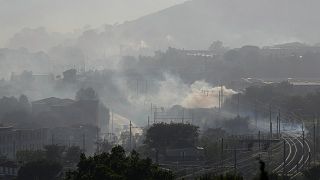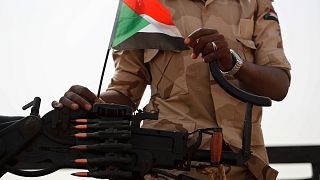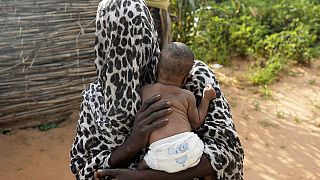Sudan
Tired and hungry, Rebecca James is one of hundreds of South Sudanese – mainly women and children – who gathered Monday in a “refugee center” in Al-Eligat, in southern neighboring Sudan, some ten kilometers off the border.
It is a transit point where people fleeing the war and famine in South Sudan spend a few days before being taken to permanent refugee camps throughout Sudan.
“I ran for two days without stopping to reach the border,” Rebecca told AFP from a region where famine was officially declared last week.
“Along the way, I saw elderly dying ladies and young men shot dead,” said the 35-year-old woman who crossed the border Saturday with her children.
Several members of her family have died of starvation or were killed in the fighting, she said.
South Sudan, the youngest of the nations of the world, was born in 2011 after its separation from Sudan but it sank into the civil war from December 2013.
According to the UN High Commissioner for Refugees (UNHCR), some 32,000 South Sudanese have sought refuge in Sudan since the beginning of the year and tens of thousands more are expected to emulate them in the coming months.
“The level of arrivals has so far exceeded our initial estimates,” UNHCR said.
Sudan has already welcomed some 330,000 nationals from its southern neighbor since the start of the civil war.
‘Our people are dying of hunger’
“People are dying of hunger, they have no food, and many have fled into the forests where there is food … and shelter,” said Peter Kwang, a Neur chief of the South-Sudanese, while collecting food packaging at the Al-Eligat center.
“Many villages have been completely burnt down by government forces,” he said.
The civil war in South Sudan began when President Salva Kiir accused his rival and former deputy Riek Machar of fomenting a coup.
The fierce fighting between the supporters of Mr. Kiir of the Dinka tribe and those of Mr. Machar of the Neur tribe have caused tens of thousands of deaths. More than three million people have been displaced.
“I arrived here after walking for 10 days during which I often hid in the forest to flee the fighting,” said Await Kong, 75, sitting on a bag of sorghum, staple food in Sudan.
“I arrived with my daughter, but I have no news from the rest of my family,” he adds.
Humanitarian officials in Al-Eligat say their center, run by the Sudanese authorities and the Sudanese Red Crescent Society, is only equipped to provide basic aid to refugees, such as food provided by UNHCR and its partners.
Set on cultivated land along a highway that connects the border with Kosti, the capital of the Nile-White State, the camp has washrooms and makeshift toilets.
Foreign aid workers distribute aid to hungry refugees.
“During the 65 km that we had to travel before arriving at the border, we ate only tree leaves,” says 13-year-old Stephen.
“My mother and I fled after my father’s death in the fighting,” he said.













01:24
South Sudan: World Food Programme airdrops food, warns of famine
01:05
Ethiopia's mega-dam on the Nile is "now complete", Prime Minister says
01:49
Sudanese refugees in Chad face deepening humanitarian crisis
01:51
South Sudan launches military court to enforce accountability and justice
01:10
Young South Sudanese player selected for NBA basketball team
01:52
UN's crucial humanitarian aid work faces a clouded future amid cuts in funds